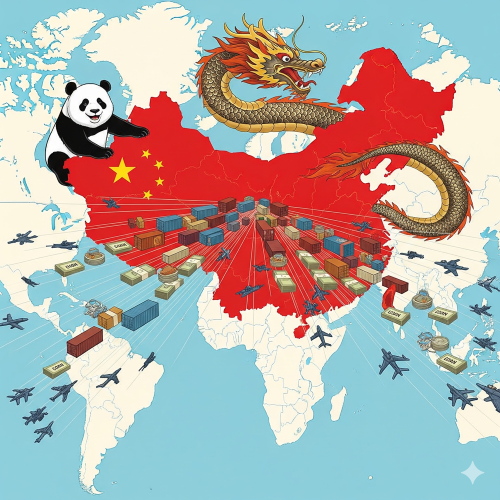To what extent does China’s economic influence (via trade, debt holdings, and technology exports) affect U.S. policy decisions?

China's economic influence significantly affects U.S. policy decisions, primarily by creating dependencies and leverage in trade, finance, and technology.
This influence forces U.S. policymakers to balance economic interests against national security concerns and geopolitical rivalry.
Trade and Economic Coercion
China's role as the U.S.'s largest merchandise trading partner gives it immense leverage. The U.S. relies on China for a vast range of consumer goods and industrial components, while China is a crucial market for U.S. exports, particularly in agriculture, technology, and services.
-
Manufacturing Reliance: For decades, U.S. manufacturing has become increasingly reliant on Chinese supply chains for parts and final assembly. This economic interdependence makes U.S. policymakers hesitant to take actions that could disrupt trade and harm American businesses and consumers. Any significant increase in tariffs or trade barriers, for example, can lead to higher prices in the U.S. and a negative impact on sectors that depend on Chinese inputs.
-
Targeted Retaliation: China has shown a willingness to use its market power as a tool for economic coercion. When the U.S. government takes a stance that Beijing views as a challenge to its interests, China can retaliate by imposing tariffs on specific U.S. exports, such as agricultural products. This can put political pressure on U.S. lawmakers from states that are heavily reliant on these exports. The U.S.-China trade war that began in 2018 is a prime example of this dynamic, where both countries imposed tariffs on billions of dollars in goods, affecting businesses and consumers on both sides.
-
Incentives for Conformity: On the flip side, the promise of market access and investment from China is a powerful incentive for U.S. companies to lobby against policies that could provoke Beijing. These firms often argue that maintaining a good relationship with China is essential for their bottom line and for U.S. competitiveness.
Debt Holdings and Financial Interdependence
For years, China was the largest foreign holder of U.S. Treasury securities, though it is now the second-largest after Japan. The fear that China could "weaponize" its debt holdings by selling a large portion of them has been a recurring theme in U.S. policy debates.
-
Leverage is Limited: While some policymakers and analysts have expressed concern that China's debt holdings give it leverage over the U.S., most economists argue that this leverage is limited. A large-scale sell-off of U.S. debt by China would likely harm China more than the U.S. because it would reduce the value of China's remaining reserves and could trigger a global financial crisis that would hurt China's own economy.
-
Shared Interest: The reality is that both countries have a shared interest in the stability of the global financial system. The U.S. depends on China to help finance its debt and keep interest rates low, while China needs to maintain the value of its dollar reserves. This shared interest creates a form of mutually assured economic destruction, which, paradoxically, acts as a check on both countries' behavior.
Technology Exports and Supply Chain Vulnerabilities
U.S. reliance on Chinese technology and its role in global technology supply chains has become a major national security concern that directly influences U.S. policy.
-
Telecommunications and 5G: The U.S. has banned Chinese companies like Huawei from its 5G networks, citing national security risks. This policy is based on the concern that Chinese law could compel these companies to provide state intelligence with access to private data or to build "backdoors" into their equipment for espionage or sabotage. This has led to a major policy debate about how to ensure the security of critical infrastructure.
-
Chip Manufacturing: China's growing dominance in manufacturing and processing crucial components, such as rare earth elements and legacy semiconductors, has created significant supply chain vulnerabilities. A disruption in the flow of these components from China could cripple key U.S. industries, from consumer electronics to defense manufacturing. In response, the U.S. has passed legislation like the CHIPS and Science Act to boost domestic production of semiconductors and reduce its reliance on Chinese supply chains.
-
Data Security and Social Media: The popularity of Chinese-owned apps like TikTok in the U.S. has raised concerns about the security of American user data and the potential for the Chinese government to use the app to spread disinformation or influence public opinion. This has prompted U.S. lawmakers to consider a nationwide ban on the app, highlighting how technological dependence is forcing policy decisions related to data privacy and national security.
In conclusion, China's economic influence is a powerful force that deeply affects U.S. policy. It creates a complex web of dependencies that forces policymakers to weigh economic benefits against national security risks. While trade and technology are the primary sources of leverage, the financial relationship, particularly concerning debt, acts as a stabilizing factor. This intricate balance ensures that the economic relationship between the two nations will continue to be a central and highly debated aspect of U.S. policy for the foreseeable future.
- Questions and Answers
- Opinion
- Motivational and Inspiring Story
- Technology
- Live and Let live
- Focus
- Geopolitics
- Military-Arms/Equipment
- Безопасность
- Economy
- Beasts of Nations
- Machine Tools-The “Mother Industry”
- Art
- Causes
- Crafts
- Dance
- Drinks
- Film/Movie
- Fitness
- Food
- Игры
- Gardening
- Health
- Главная
- Literature
- Music
- Networking
- Другое
- Party
- Religion
- Shopping
- Sports
- Theater
- Health and Wellness
- News
- Culture

